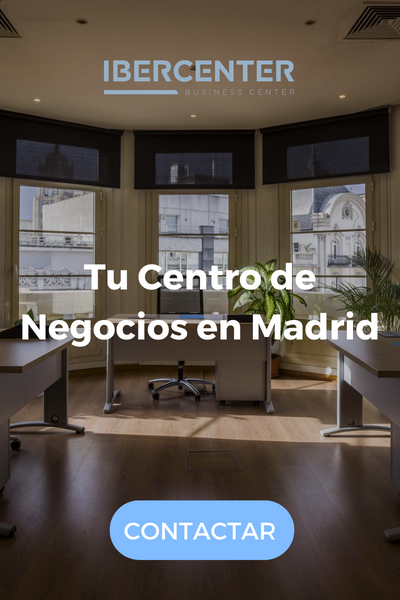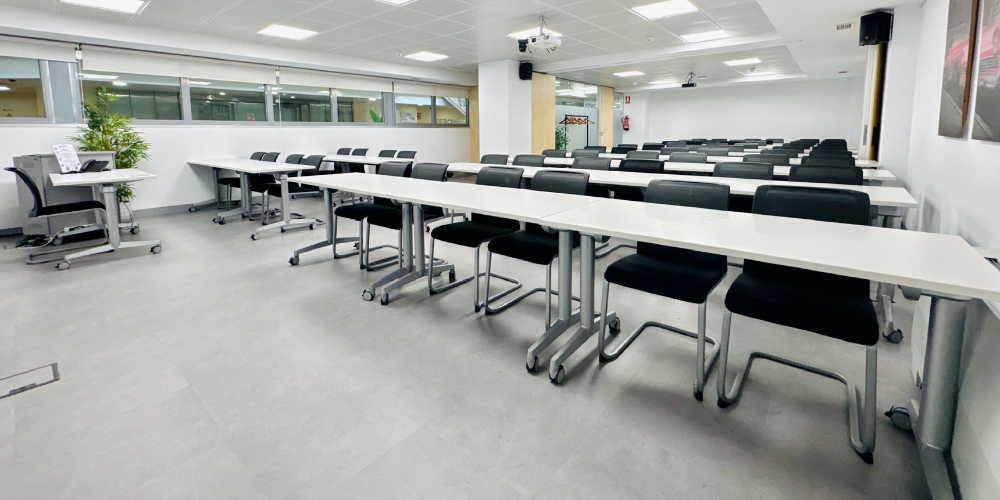In the process of defining the workspace, a crucial decision arises: whether to opt for a conventional office or a coworking space. This choice may seem like a simple formality, but in reality, it profoundly influences the development of any business, its projection and even its identity.
On the one hand, the conventional office offers a solid image, and a space designed exclusively for the needs of the company. It is a model that is traditionally associated with stability and professionalism. Conventional offices are usually located in exclusive buildings, in strategic locations, and allow a great deal of freedom in terms of customising the space, from the layout of the furniture to the decorative elements that reinforce the corporate identity.
However, opting for this model also entails a significant investment, which involves both the initial costs of implementation and others that must be maintained over time: personnel, supplies, maintenance, community expenses, etc.
In contrast, coworking represents a flexible, agile and modern alternative. These shared spaces have gained popularity among companies of all sizes and types, which are looking to cut costs without sacrificing a professional environment. In a coworking space, companies have access to a wide range of services without having to make large financial commitments or administrative burdens.
You pay a fee that includes virtually everything from furniture and administrative support to high-speed internet access, cleaning and use of common areas such as meeting rooms and breakout areas. These types of spaces also foster a collaborative environment, allowing users to easily connect with other professionals, which can open doors to new business opportunities.
Choosing between a conventional office and a coworking space is not a minor decision. In fact, it can make the difference between a company that adapts and thrives in its environment and one that is constrained by its workspace. It’s not just about where the desks will be placed or what view the meeting room will have; workspace has the power to influence corporate culture, employee satisfaction and, of course, customer relations. While a conventional office can reinforce the perception of stability and exclusivity, coworking offers the flexibility and dynamism that many of today’s businesses need to thrive in an ever-changing marketplace.
The challenge, then, is to understand which of these two models best meets the specific needs of each business. An established company seeking to project an image of solidity may be inclined towards the conventional office, while a start-up in full expansion or an established company that wants to dispense with the figure of the office manager and whose activity is changing will find more advantages in the flexibility of coworking. Each company is unique and, consequently, the space where it operates should also be unique. Choosing the right environment to work in not only has an impact on daily productivity, but in the long term, it becomes a determining factor in the success of the company.

What is a conventional office?
A conventional office has traditionally been considered as the option of choice for businesses looking for an exclusive, tailor-made space. This type of office offers complete autonomy over the working environment, as every aspect, from layout to decoration, can be controlled with complete freedom. This autonomy is undoubtedly one of its greatest attractions, allowing each company to design the space according to its own needs and, above all, according to its brand image.
When we talk about a conventional office, we are referring to a space that can be either owned or rented, but always with a private and exclusive use. It is not shared with other professionals or other companies, which provides absolute privacy and, in many cases, greater peace of mind.
In addition, on a visual and aesthetic level, the conventional office projects a coherent and distinctive corporate identity, with furnishings and layout that reflect the company’s character. This not only enhances the experience of those who work there every day, but also positively influences the impression customers and partners receive when they visit the premises.
However, these benefits come with certain obligations. One of the main disadvantages of the conventional office is undoubtedly the cost. The initial investment is often considerable, and not just in terms of renting or buying the space, but also in terms of the fit-out, furniture and equipment needed for the team to be able to work effectively.
In addition, fixed costs such as electricity, water, cleaning and maintenance are recurrent and are fully covered by the company. This often places an additional burden on budgets, which can be a hindrance especially for emerging or expanding businesses that do not yet have consolidated financial stability.
On the other hand, the conventional office can be limiting in terms of flexibility. Leases tend to be medium to long-term, which means it is more difficult to adapt quickly to changes in team size or business needs. For a growing company, for example, this can become a challenge if the office becomes too small and a new space has to be found, with the expense and logistics involved. Equally, if the business goes through a period of adjustment and space needs to be reduced, the same contractual rigidity can create problems.
Despite these limitations, the conventional office remains an attractive option for many companies that value stability and privacy, and are looking for a fully personalised working environment. For established companies with a steady flow of work and clients, the initial financial effort can be seen as a long-term investment that results in a stable and distinctive headquarters. It is a choice that projects seriousness and commitment, and is particularly suitable for those sectors where the image of solidity and trust is a key value, such as the legal, financial or corporate sectors in general.
In short, the conventional office represents that alternative that combines total control with the possibility of creating a unique, customised space, aligned with the company’s identity and values. However, it is important to bear in mind that its viability will always depend on the status and specific needs of each business.
While some companies find it the perfect environment for their business, others may be constrained by the costs and demands associated with it. It is therefore a decision that should be carefully considered, weighing the advantages against the potential disadvantages, to ensure that it really is the best option in the long term.
What is an equipped office?
Coworking spaces have revolutionised the way we work and, in many cases, how we conceive the concept of an office. Far from the rigidity and cost of a conventional office, coworking spaces offer a much more flexible and accessible approach.
When you enter one of these spaces, you find a dynamic environment, designed to adapt to the pace of each professional. They are places where some areas are shared, but they can offer you the privacy you need and are perfectly equipped to meet the different needs of the users.
Coworking is centred on the idea of community. This is reflected in the design of the space itself, which invites interaction and collaboration, with common areas that encourage the exchange of ideas and networking. In addition, these spaces offer a complete package of services, so that users do not have to worry about anything: they are equipped with high-speed internet, ergonomic furniture, multifunctional equipment, administrative, maintenance and cleaning staff, among others. All of this is included in a fixed fee, with no need for large commitments. In essence, it is a ready-to-use office, where you just need to arrive and start working.
One of the main advantages of coworking is undoubtedly its flexibility. Unlike a conventional office, here the duration of the contract is established by the companies. You can start working in a coworking space for a month and the following month, if your needs change, adjust the space you occupy or simply leave. This is ideal for growing companies or businesses that need to adapt quickly to market fluctuations.
In addition, the possibility of accessing furnished offices without the need to invest in initial infrastructure is particularly attractive for start-ups, freelancers and small businesses that do not want to spend a large part of their budget on traditional renting.
However, this model is not perfect and also has its disadvantages. One of the most obvious is the lack of privacy. Although many coworking spaces offer private offices, so you only share the common areas with other companies and professionals.
On the other hand, the lack of customisation is another limitation that some professionals found, however, as in the case of ibercenter, it is becoming more and more common to offer the possibility of customising your office within a coworking space.
That said, coworking offers a number of advantages for those who value adaptability and efficiency. Not only do they reduce operating costs, but they also provide access to a diverse community of professionals with whom to share ideas and opportunities. In this sense, coworking becomes a catalyst for networking, something that is difficult to replicate in the isolation of a conventional office. The ability to connect with others, collaborate on projects and learn from different sectors is an added value that attracts many entrepreneurs and small businesses that otherwise would not have this type of interaction in their day-to-day lives.
In the end, the choice between an office equipped in a coworking space and a conventional office depends on the priorities of each business. For some, the flexibility and the possibility of creating synergies with other professionals make coworking an almost unbeatable option. For others, on the other hand, the absolute control offered by a conventional office is more appropriate. The important thing is to assess the specific needs of each company and determine which type of space best suits their objectives and way of working.
Comparison between conventional and coworking offices.
When considering the differences between a conventional office and a coworking space, several key aspects emerge that can tip the balance one way or the other. Firstly, cost is one of the most notable differences. A conventional office requires a considerable initial investment, which includes not only the rental or purchase of the space, but also the fit-out: furniture, equipment, technological infrastructure, and all those installation costs that can skyrocket before starting to operate.
In addition, fixed costs such as electricity, water, cleaning and maintenance are permanent and can be unpredictable, especially in older buildings where maintenance can be a headache. All this translates into a significant financial burden which, in many cases, represents a considerable financial commitment in the long term.
Not to mention the salary of the person needed to deal with all these issues, of which there is no shortage.
Coworking, on the other hand, offers a much more flexible and accessible cost structure. Here, there is no need to make any initial investment, as the offices are fully equipped and fitted out and the monthly fee includes practically everything: furniture, telephone, internet, reception staff, maintenance, electricity, water, air conditioning, community expenses, cleaning, etc., as well as access to common areas and rooms.
This model is perfectly suited to companies that prefer to reduce their fixed costs and optimise their monthly budget, without having to worry about unforeseen maintenance or utility bills that fluctuate from month to month. In terms of economic flexibility, coworking is much less costly and allows companies to focus their resources on aspects directly related to business growth, which is why more and more consolidated companies are opting for this office model.
Beyond the financial aspect, contractual and space flexibility also make a big difference. Conventional offices often involve long-term contracts of three to five years, which can restrict a company’s ability to manoeuvre, especially if its space requirements change over time. These long-term commitments may be suitable for companies with a stable outlook, but are less attractive for expanding or transforming businesses that need the freedom to adjust the size of the space as circumstances change.
Coworking spaces, on the other hand, offer much more flexible plans, allowing you to rent space by the month, week or even day. This type of contract gives companies the ability to adapt immediately to their needs, without the pressure of being tied to one place for years.
The scope of services included and the customisation of the working environment is another factor to be considered. In a conventional office, everything depends on the company. From the telephone to the printer to the internet network to the air conditioning, each service is the company’s own responsibility. While this allows for full customisation of the space, it also means additional expense and management burden.
In a coworking space, on the other hand, most of these services are included, and companies can benefit from them without having to manage every detail individually. This allows them to concentrate on the work, as issues such as cleaning, equipment maintenance, and the supply of basic materials are covered by the coworking space itself. However, the downside is that coworking spaces offer less scope for customisation: coworking offices tend to be functional and standardised, and although they often have an attractive design, they do not always reflect the specific identity of each company.
One of the most notable advantages of coworking is the access to networks and networking opportunities. In a shared environment, interaction with other professionals is almost inevitable. Coworking spaces are designed to encourage the exchange of ideas and collaboration, which opens doors to new business relationships, collaborations and even learning opportunities.
For many companies and freelancers, being surrounded by a diverse community of professionals becomes an inexhaustible source of contacts and resources that are difficult to find in the solitude of a conventional office. This kind of daily interaction helps to create synergies that can be very valuable, especially for startups and SMEs that are in a growth phase and want to increase their visibility in the sector.
Finally, the professional image and prestige of the space are also important considerations. The conventional office, located in an exclusive building and with a carefully chosen design, projects an image of stability and seriousness that can be very attractive to certain clients and sectors. It is not just about having a place to work, but about creating a space that reinforces corporate identity and conveys professionalism from the first moment a client walks through the door. In coworking spaces, although many have modern and well-equipped spaces, the perception can vary. As they are shared environments, exclusivity is sometimes lost and, for some businesses, this can detract in terms of prestige projection.
Ultimately, the choice between a conventional office and a coworking space depends largely on the needs, priorities and style of each company. While some value total control, privacy and the ability to customise down to the last detail, others benefit more from the flexibility, savings and networking opportunities that coworking offers. Understanding these aspects is key to making a decision that is not only viable in the present, but will also drive business growth and adaptation in the future.
Factors to consider when choosing
The choice between a conventional office and a coworking space depends largely on the business profile and the specific needs of each company. There is no one-size-fits-all solution; rather, each type of space offers advantages that are better suited to certain sectors and ways of working. Therefore, the analysis must start with an understanding of the nature and objectives of the company in question.
Coworking spaces are often a very suitable option for all types of companies and activities. These spaces offer the flexibility and adaptability that any company needs. As an example, in a coworking space, a startup can start with just a few people and, as it grows, expand quickly without having to move to another location.
In addition, the collaborative environment of a coworking is very enriching for businesses that value creativity, dynamism and the opportunity to connect with other entrepreneurs. It is common to see how companies in the technology sector, digital marketing agencies and independent professionals find in coworking not only a place to work, but also an environment that stimulates innovation and the exchange of ideas.
However, not all businesses thrive in a shared space. Companies that require tight control over their environment, such as those in the legal or financial sector or corporations of a certain size, often prefer a conventional office. For such companies, privacy and control over all aspects of the workspace are essential.
In a conventional office, they can create an environment that perfectly matches their standards of security, confidentiality and exclusivity, something that is difficult to achieve in a coworking space. In addition, many of these companies need to project an image of stability and prestige, which is reinforced with their own personalised space, especially if the business is aimed at clients who value seriousness and tradition.
Consideration should also be given to those businesses that are at a point of expansion or consolidation. For companies that have achieved a certain stability and wish to establish a solid headquarters, the conventional office represents a long-term investment that can become a symbol of their growth and success. Such a space offers the opportunity to design a totally bespoke working environment, aligned with the company’s culture and at the same time serving as an asset that projects professionalism. Sectors such as consultancy, law and investment firms often see this as an ideal way to reinforce their image and ensure total control over their space.
On the other hand, freelancers and micro-businesses, especially in creative areas such as design, communication or programming, find coworking a perfect environment for their day-to-day work. This type of professional benefits enormously from the possibility of establishing contact networks without leaving their work environment. Being surrounded by other professionals with different profiles opens doors to collaborations and opportunities that would otherwise be more difficult to find. In addition, the reduced cost and the possibility of adjusting the space to their real needs allow these small businesses to operate much more efficiently.
Ultimately, the ideal space for each business will always depend on its objectives, the way it operates and the type of interaction it seeks. Startups and freelancers are likely to find the flexibility and creative environment they need to thrive in coworking. Established companies, on the other hand, will be better served in a conventional office, where they can control all aspects of their working environment and project an image of solidity and exclusivity. The key is to carefully evaluate each option and understand that the workspace is not just a physical place, but an extension of the identity and strategy of the business, an element that, if well chosen, will contribute decisively to its success.
Ibercenter, the perfect space
At Ibercenter we have been offering workspace solutions for companies in Madrid for more than 25 years, and we know first-hand the importance of choosing the right environment for each project. Our aim is that you can focus exclusively on growing your business, while we take care of providing the space and services necessary for you to develop your activity comfortably and efficiently. We are proud to be a benchmark in office rental in Madrid and have three centres located in strategic areas: Azca, Gran Vía and Velázquez. Each of them is designed to project a professional and prestigious image, with the versatility to adapt to all kinds of business needs.
We offer coworking spaces in Madrid that allow entrepreneurs, freelancers and SMEs to benefit from a flexible working environment, where collaboration and the creation of synergies are the order of the day. We firmly believe in the value of a dynamic environment that facilitates networking, and that is why we design our spaces so that new opportunities for professionals to connect arise every day.
We make sure you have access to a wide range of services including high-speed internet, cleaning services, and access to well-equipped common areas, so that you only have to worry about what really matters: growing your business.
We understand the great importance of privacy to work and that is why in our locations we focus on private work spaces, equipped with multiple common areas and rooms, along with the support of a great team, in order to offer the best office rental service in Madrid, with total flexibility.
Furthermore, we know that meetings are a fundamental component in the day-to-day running of any business, which is why we offer you the possibility of renting meeting rooms in Madrid, fully equipped and with various configurations to suit the nature of each meeting. Whether you need a space to receive an important client or you are looking for a place to hold a presentation, our rooms are designed to facilitate communication and leave a lasting impression.
At Ibercenter, we are more than just a space provider. We consider ourselves your allies in the success of your business, and that is why we provide you with an administrative team that takes care of all the tasks related to the reception and answering of calls, allowing your company to project a professional image at all times. In addition, we understand the importance of flexibility in today’s working environment, so we work without rigid contracts, adapting to changes that may arise in your business.
For us, the choice of a workspace is not just a question of location, but of finding the ideal place that reflects the essence of each company.
Whether you prefer a coworking space in Madrid to connect with other professionals or you need a private office that allows you to work in an exclusive environment, we are here to help you find the solution that best suits your needs. Because at Ibercenter, more than just offering spaces, we accompany each client on their path to success, ensuring they have the support and resources they need to thrive in a quality working environment.
Conclusion
At the end of the day, the choice between a conventional office and a coworking space should be aligned with the identity of each business and its medium and long-term goals. Both models have a lot to offer, but their success depends on how they fit the specific needs of each company.
The conventional office, with its stable structure and capacity for total customisation, is ideal for those looking for an exclusive space, where privacy and professional image are essential. This type of environment is perfect for established companies that need to project an image of solidity and control, and who value the possibility of customising the space to suit their needs. The security and controlled environment provided by a conventional office allows companies to have the peace of mind of knowing that they have complete control over their workspace, a key factor for sectors such as law and finance, where discretion and trust are essential.
On the other hand, coworking offers a flexibility that is hard to match. Here, adaptability is the norm: being able to adjust the space as needs arise makes these environments an exceptionally valuable option for startups, freelancers and small businesses in constant evolution.
The absence of significant upfront investment and access to a vibrant and diverse community make coworking an unbeatable option for those looking for dynamism, cost savings and new opportunities for collaboration. In a coworking environment, the environment is part of an ecosystem that fosters networking and creativity, a great asset for those who value innovation and synergies with other professionals.
So how to choose? The key is to consider both the current state and the future projection of the business. For a company with a stable and well-defined structure, which needs a long-lasting space adapted to its own characteristics, a conventional office will be the best bet. On the other hand, for those looking for flexibility, reduced initial costs and the opportunity to connect with a network of professionals from different sectors, coworking offers a host of advantages that can boost growth and evolution.
Finally, at Ibercenter we are here to help each client find the space that best suits their needs and circumstances. We understand that each company is unique, and we specialise in offering both coworking spaces and conventional offices in Madrid that perfectly fit the requirements of each project.
Whether you want an exclusive and customisable environment or a shared space full of opportunities, we are committed to helping you find the place where your business can thrive. Because, ultimately, choosing the right workspace is much more than a logistical question; it’s an investment in the future of your business and the success you want to achieve.




